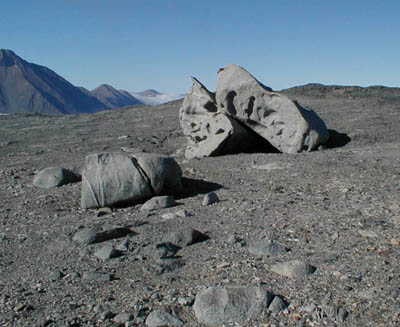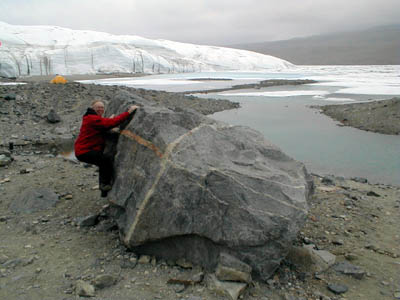
 http://www.exo.net/~pauld/antarctica/dryvalleys.html
http://www.exo.net/~pauld/antarctica/dryvalleys.html

 http://www.exo.net/~pauld/antarctica/dryvalleys.html
http://www.exo.net/~pauld/antarctica/dryvalleys.html
Popular Science for March 2004 (p 56) had a Dawn Stover piece on the Permian-Triassic extinction. There's a table showing four possibilities and a summary of points for each, and also writes that "it's possible that more than theory is correct." A huge impact on water would send a shockwave throughout the oceans and seas, with the potential of releasing the methane in gas hydrates and the poisonous hydrogen sulfide gas that displaces oxygen in the depths. She ignores that likelier possibility and writes instead that an impact could trigger volcanic eruptions, "which in turn could have kicked off deadly acid rain showers." My guess is, Dawn Stover went to Penn State and studied volcanology for a while. ;')Evidence Of Meteor ImpactMost scientists agree a meteor impact, called Chicxulub, in Mexico's Yucatan Peninsula, accompanied the extinction of the dinosaurs 65 million years ago. But until now, the time of the Great Dying 250 million years ago, when 90 percent of marine and 80 percent of land life perished, lacked evidence and a location for a similar impact event. Becker and her team found extensive evidence of a 125-mile-wide crater, called Bedout, off the northwestern coast of Australia... During recent research in Antarctica, Becker and her team found meteoric fragments in a thin claystone "breccia" layer, pointing to an end-Permian event. The breccia contains the impact debris that resettled in a layer of sediment at end-Permian time. They also found "shocked quartz" in this area and in Australia... Quartz can be fractured by extreme volcanic activity, but only in one direction. Shocked quartz is fractured in several directions and is therefore believed to be a good tracer for the impact of a meteor... The Bedout impact crater is also associated in time with extreme volcanism and the break-up of Pangea. "We think that mass extinctions may be defined by catastrophes like impact and volcanism occurring synchronously in time," Becker said. "This is what happened 65 million years ago at Chicxulub but was largely dismissed by scientists as merely a coincidence. With the discovery of Bedout, I don't think we can call such catastrophes occurring together a coincidence anymore," she added.
Found Off Australian Coast
by Donald Savage
May 13, 2004
The Suspect The Theory The Evidence The Proponents The Holes Asteroid impact A space rock strikes in the tropics, spews debris into the air and triggers lethal climate change Scientists found 250 million year old rocks from Antarctica and China said to contain meteorite fragments Researchers at the University of Rochester, Harvard, and UC Santa Barbara Scientists have yet to find the ultimate smoking gun, a crater Sudden methane explosion A massive cloud of methane gas abruptly bursts from the ocean, cataclysmic flooding and fires ensue Great Dying fossils show a sudden sharp rise in carbon-12 isotopes, best explained by a methane belch Chemical engineer Gregory Ryskin at Northwestern University The explosion requires an improbable 10,000 gigatons of methane Slow methane leak Volcanoes of frozen deposits leak methane over thousands of years, depleting oxygen The burrowing reptile Lystrosaurus, adapted for low-oxygen conditions, thrived during this period Researchers at the University of Oregon, the South African Museum, and the University of Washington The leak could not deplete enought oxygen to cause global death, critics say Hydrogen sulfide stink bomb Lethal levels of hydrogen sulfide, emitted by anaerobic bacteria, are expelled from the ocean into the air Proponents are searching for signs of sulfur bacteria in Japanese sediments dated to the extinction Scientists at Penn State, the University of Colorado, and the University of Tokyo There's no proof that the upper layers of ancient oceans were devoid of oxygen
an oldie I found while looking for something else. :')
New Crater Found Down Under
Source: space.com
Published: 21 April 2000 Author: Stewart Taggart
Posted on 04/21/2000 09:25:45 PDT by RightWhale
http://www.freerepublic.com/forum/a390081092974.htm